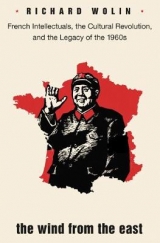
Wind from the East (eBook)
Notice: Trying to get property 'ebookformat' of non-object in /var/www/webshop-frontend/module/Lehmannsportal/view/lehmannsportal/book/view.phtml on line 238
Warning: Invalid argument supplied for foreach() in /var/www/webshop-frontend/module/Lehmannsportal/view/lehmannsportal/book/view.phtml on line 238
408 Seiten
Princeton University Press (Verlag)
978-1-4008-3437-2 (ISBN)
Michel Foucault, Jean-Paul Sartre, Julia Kristeva, Phillipe Sollers, and Jean-Luc Godard. During the 1960s, a who's who of French thinkers, writers, and artists, spurred by China's Cultural Revolution, were seized with a fascination for Maoism. Combining a merciless expos of left-wing political folly and cross-cultural misunderstanding with a spirited defense of the 1960s, The Wind from the East tells the colorful story of this legendary period in France. Richard Wolin shows how French students and intellectuals, inspired by their perceptions of the Cultural Revolution, and motivated by utopian hopes, incited grassroots social movements and reinvigorated French civic and cultural life. Wolin's riveting narrative reveals that Maoism's allure among France's best and brightest actually had little to do with a real understanding of Chinese politics. Instead, it paradoxically served as a vehicle for an emancipatory transformation of French society. French student leftists took up the trope of 'cultural revolution,' applying it to their criticisms of everyday life. Wolin examines how Maoism captured the imaginations of France's leading cultural figures, influencing Sartre's 'perfect Maoist moment', Foucault's conception of power, Sollers's chic, leftist intellectual journal Tel Quel, as well as Kristeva's book on Chinese women-which included a vigorous defense of foot-binding. Recounting the cultural and political odyssey of French students and intellectuals in the 1960s, The Wind from the East illustrates how the Maoist phenomenon unexpectedly sparked a democratic political sea change in France.
Michel Foucault, Jean-Paul Sartre, Julia Kristeva, Phillipe Sollers, and Jean-Luc Godard. During the 1960s, a who's who of French thinkers, writers, and artists, spurred by China's Cultural Revolution, were seized with a fascination for Maoism. Combining a merciless expos of left-wing political folly and cross-cultural misunderstanding with a spirited defense of the 1960s, The Wind from the East tells the colorful story of this legendary period in France. Richard Wolin shows how French students and intellectuals, inspired by their perceptions of the Cultural Revolution, and motivated by utopian hopes, incited grassroots social movements and reinvigorated French civic and cultural life. Wolin's riveting narrative reveals that Maoism's allure among France's best and brightest actually had little to do with a real understanding of Chinese politics. Instead, it paradoxically served as a vehicle for an emancipatory transformation of French society. French student leftists took up the trope of "e;cultural revolution,"e; applying it to their criticisms of everyday life. Wolin examines how Maoism captured the imaginations of France's leading cultural figures, influencing Sartre's "e;perfect Maoist moment"e;; Foucault's conception of power; Sollers's chic, leftist intellectual journal Tel Quel; as well as Kristeva's book on Chinese women--which included a vigorous defense of foot-binding. Recounting the cultural and political odyssey of French students and intellectuals in the 1960s, The Wind from the East illustrates how the Maoist phenomenon unexpectedly sparked a democratic political sea change in France.
| Sprache | englisch |
|---|---|
| Themenwelt | Geschichte ► Allgemeine Geschichte ► Neuzeit (bis 1918) |
| Geisteswissenschaften ► Philosophie ► Philosophie der Neuzeit | |
| Sozialwissenschaften ► Soziologie ► Makrosoziologie | |
| ISBN-10 | 1-4008-3437-6 / 1400834376 |
| ISBN-13 | 978-1-4008-3437-2 / 9781400834372 |
| Haben Sie eine Frage zum Produkt? |
aus dem Bereich



